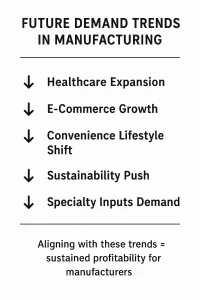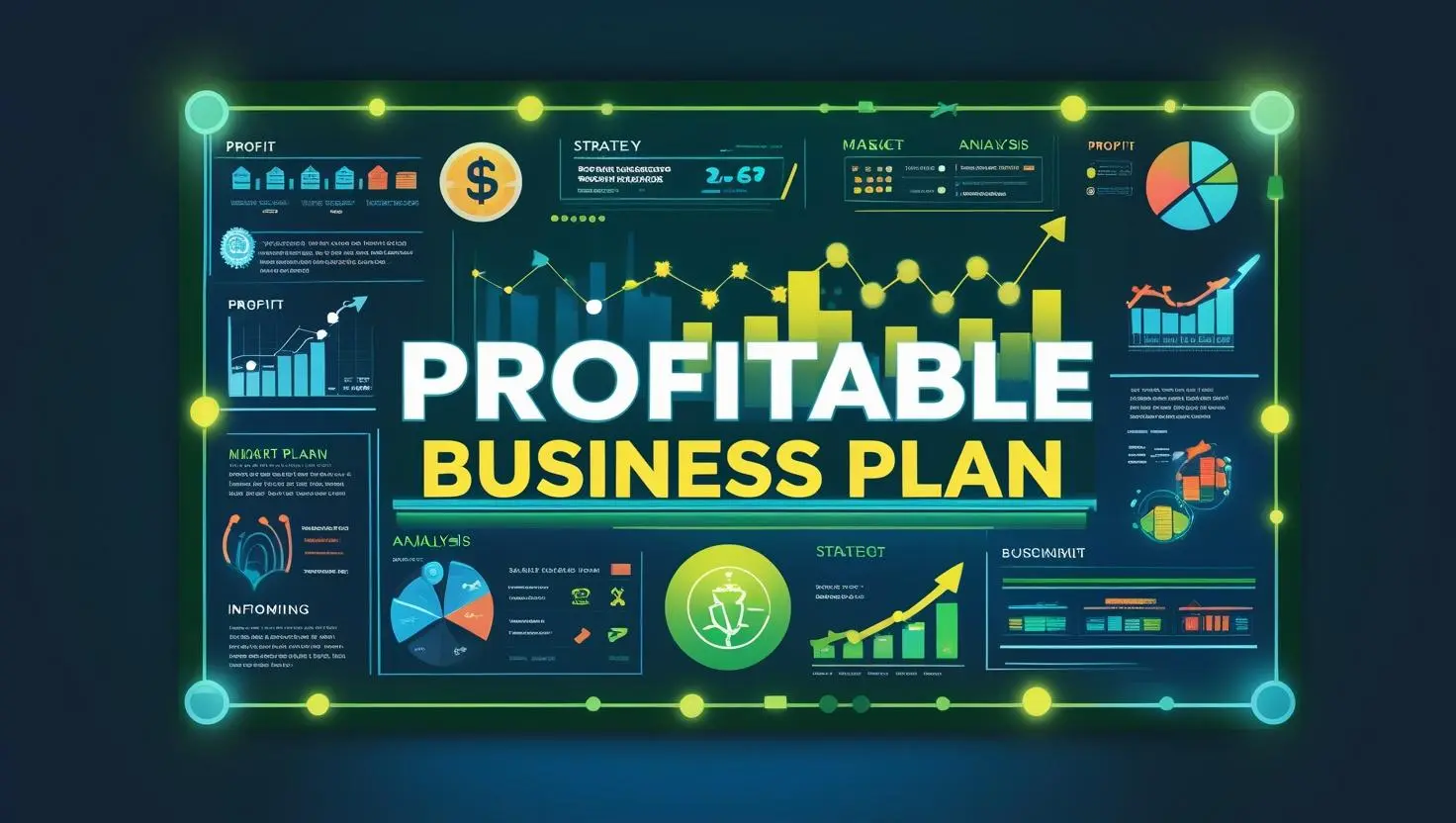Why Manufacturing Offers Strong Prospects for Entrepreneurs
High-Growth Sectors in Manufacturing
Healthcare and Medical Consumables
Detail project report on Profitable business plan
Specialty Food and Agro-Processing
Food processing continues to be an important driver of investment due to the push for convenience foods, health-related ingredients, and premium food products. There are opportunities to add value to agricultural production with products like spice extracts, fruit powders, dehydrated vegetables, and nutrient-dense snacks.
Consumers today are interested in food ingredients that they can track, that are safe, and for which they can trust the quality – and there are multiple sub-segments that entrepreneurs can access. Agro–processing start–ups can grow from a regional process and become an international process with good process standardization and good quality packaging.
Sustainable Packaging and Environment-Friendly Products
Find our Handbook
Specialty Chemicals and Industrial Additives
Manufacturers of specialty chemicals like performance additives, water treatment chemicals, resins, flavours, adhesives, and coatings are all experiencing strong growth. Many companies in downstream industries — such as packaging, automotive, construction, a nd textiles — depend on a reliable supply of chemicals for their manufacturing processes. Through this dependence, a consistent and reliable demand exists for high-quality chemicals. Entrepreneurs entering this market with the right formulations and technologies can access domestic and export markets for good margins.
Plastic and Polymer-Based Goods
Related articles:- 4 Most Profitable Manufacturing Businesses: Beverage Cans, Agro-Fiber Pulp, Saline, and Eggshell Powder
Constructing a Strong Manufacturing Business
Why Manufacturing Offers Strong Prospects for Entrepreneurs
High-Growth Sectors in Manufacturing
Healthcare and Medical Consumables
Detail project report on Profitable business plan
Specialty Food and Agro-Processing
Food processing continues to be an important driver of investment due to the push for convenience foods, health-related ingredients, and premium food products. There are opportunities to add value to agricultural production with products like spice extracts, fruit powders, dehydrated vegetables, and nutrient-dense snacks. Consumers today are interested in food ingredients that they can track, that are safe, and for which they can trust the quality – and there are multiple sub-segments that entrepreneurs can access. Agro–processing start–ups can grow from a regional process and become an international process with good process standardization and good quality packaging.
Sustainable Packaging and Environment-Friendly Products
Find our Handbook
Specialty Chemicals and Industrial Additives
Manufacturers of specialty chemicals like performance additives, water treatment chemicals, resins, flavours, adhesives, and coatings are all experiencing strong growth. Many companies in downstream industries — such as packaging, automotive, construction, and textiles — depend on a reliable supply of chemicals for their manufacturing processes. Through this dependence, a consistent and reliable demand exists for high-quality chemicals. Entrepreneurs entering this market with the right formulations and technologies can access domestic and export markets for good margins.
Plastic and Polymer-Based Goods
Typical Manufacturing Process Flow
There are similarities in the vast and diverse nature of manufacturing despite differences among industries. The general process is standard for many manufacturing operations — materials are delivered, evaluated, and accepted based on quality assurance standards, the materials (called inputs) are processed — washed, prepared, mixed, melted, reacted, graded, etc. — so they are ready to be processed into the new form. The input is then converted into intermediate or finished product form (which is also a type of intermediate) through some type of production process — this may include extruding, casting, forming, cooking, machining, etc. Once the production process is complete, the new form undergoes a secondary finishing process — coating, printing, trimming, sterilisation, etc. — to enhance the appearance or performance of the product. Finally, there is a quality check process to evaluate the newly designed product against specifications and applicable standards prior to shipping to storage or customer delivery.
Understanding Market Forecasts and Demand Growth

Sustained profitability in manufacturing depends on aligning with products where future demand is rising. Healthcare expansion, e-commerce delivery models, and green-regulation pressures are shaping markets worldwide. The demand curve for medical consumables and diagnostic products is expected to stay high in response to global aging and public-health investments. Processed foods are drawing consumer preference as lifestyles become faster and more nutrition-conscious. Sustainable packaging is gaining major traction due to legislation and increasing consumer awareness. Specialty chemicals and high-performance materials continue to serve a wide umbrella of downstream industries and therefore show healthy expansion forecasts. Entrepreneurs who tailor their production plans to these evolving markets stand to tap into favourable growth windows.
Marketing and Brand-Building in Industrial Ventures
Unlike retail consumer brands, industrial manufacturers sell primarily through business-to-business channels where relationships and reliability matter significantly. Building a professional brand involves having a strong product identity, clear positioning, and a credible presence across relevant trade platforms. An updated website, detailed catalogues, process videos, and technical data sheets project professionalism to global buyers. Industrial exhibitions, digital business marketplaces, and buyer-supplier portals are powerful vehicles for connecting with wholesalers, institutional purchasers, and private-label contract opportunities. Thoughtfully managed communication and dependable supply help new manufacturers quickly gain trust and recurring orders in the market.
Regulatory and Quality Assurance Considerations
Regulation is an inherent part of the manufacturing sector. Entrepreneurs must comply with applicable factory registrations, health-safety standards, and sector-specific certifications. Food manufacturers often adhere to HACCP, medical producers follow ISO 13485 or CE guidelines, and chemical makers must meet safety and environmental standards. Documented procedures, periodic quality checks, and traceability systems provide both compliance and operational efficiency. Buyers across the world increasingly insist on certified suppliers because it minimizes risks in their own supply chains. Solid commitment to compliance therefore becomes a competitive differentiator and long-term advantage.
Scaling Strategies for Sustained Growth
Once production is stabilised, successful manufacturers often adopt either a capacity-expansion strategy or diversification into adjoining product categories. Expanding plant capacity allows entrepreneurs to meet growing demand for the primary product, improving economies of scale in raw material procurement and overhead allocation. Diversifying into related SKUs spreads market risk and appeals to a wider buyer base while leveraging existing infrastructure. Many manufacturers also embrace private-label and contract production for larger brands, optimising plant utilisation and creating supplementary revenue streams. Progressive scaling supported by continually refined processes is pivotal to long-term success.
Niir Project Consultancy Services
Entrepreneurs frequently rely on expert support while evaluating industrial opportunities, ensuring they invest in technically and commercially viable projects. Niir Project Consultancy Services (NPCS) plays a key role in this journey by preparing comprehensive market surveys and detailed techno-economic feasibility reports. These reports include information on the manufacturing process, raw material requirements, plant layouts, and financial details. Through this structured information, NPCS helps entrepreneurs assess the feasibility of setting up new industrial ventures and make knowledgeable project decisions.
Conclusion
Manufacturing continues to offer compelling investment opportunities for entrepreneurs who are ready to build disciplined operations, focus on product quality, and serve evolving market needs. From medical consumables to sustainable packaging, specialty foods, and performance chemicals, numerous fast-growing industrial segments are open to new entrants. With strategic planning, process-oriented setup, and thoughtful brand building, an industrial business can generate sustainable profits, scalable growth, and long-term industry relevance. For visionary entrepreneurs, the time to capitalize on manufacturing investment opportunities — and build their own legacy — has never been better.
Find best business idea for yourself using our startup selector tools
Frequently Asked Questions
1. What is the most important factor when choosing a manufacturing business idea?
The most critical factor is market demand. Select products that have long-term, repeat demand and are not easily replaced by alternatives. An underserved market with growing consumption — rather than a saturated space — dramatically increases your chances of profitability.
2. How much technical knowledge is required to start a manufacturing unit?
While having technical knowledge is beneficial, it isn’t mandatory. Many successful founders hire experienced production supervisors and rely on technical consultants during setup. However, having a basic understanding of the process and quality requirements will help you manage the plant effectively.
3. Should I start with a fully automated plant or a semi-automated one?
For most first-time entrepreneurs, a semi-automated plant is ideal. It reduces initial costs, allows flexibility, and makes it easier to scale. You can gradually introduce automation once there is steady demand and production volume.
4. How long does it take for a manufacturing startup to become profitable?
Typically, an industrial unit takes 12–24 months to become profitable, depending on the product, plant size, and market conditions. A lean structure, phased capacity expansion, and strong marketing can shorten the payback period.
5. What government support or incentives are available for manufacturing startups?
Depending on your country/state, support may include subsidies on machinery, interest rebates, tax incentives, export incentives, and infrastructure support under schemes like Make in India, Production Linked Incentives (PLI), or MSME development programs. Checking eligibility early in the planning phase is highly recommended.









